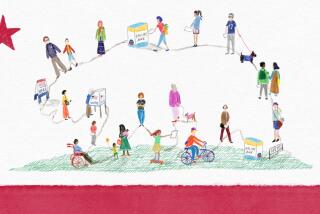L.A. Law Has Younger Look as 22-Year-Old Starts Working
- Share via
As her contemporaries were savoring their right to be admitted to any bar last summer, Jennifer Peters was admitted to the bar.
Peters became one of California’s youngest lawyers ever in July when she passed the state’s grueling bar exam at age 21. She insists, however, that it’s no big deal.
“I’m at this age, and I can’t imagine what it would be like if I was older, so it’s very hard to find it unique,” said Peters, now 22, a graduate of the University of West Los Angeles School of Law in Mar Vista. Peters, who skipped undergraduate studies altogether, starts work this week with a downtown Los Angeles law firm.
The State Bar of California does not keep statistics on the ages of successful test-takers and cannot say for sure whether Peters is the youngest person ever to pass the exam. But Susan Scott, spokeswoman for the bar, agreed that 21 is “exceptionally young.”
There may have been younger lawyers “way back in the days of Abe Lincoln, or before that,” when many states had no minimum age or academic rules governing lawyers, said Nancy Slonim, director of media services of the American Bar Assn. But Peters is “certainly unusual for modern times,” she said.
Slonim said she knows of only one lawyer younger than Peters: Stephen Baccus, who became the youngest lawyer in the country three years ago at age 17. He graduated from college at 14 and from law school at 16, and passed the Florida bar after receiving a waiver from its rules that attorneys be at least 18. California law also requires that attorneys be at least 18 years old to practice in the state.
Peters believes her youthfulness has been a selling point during her recent months of job-shopping. In interviews, she said, employers delight in “harking back to when they were 21 or 22.”
Inevitably, she said, the interviewers would get around to asking, “Can you do the work?” In reply, she would cite her experience clerking for lawyers and a judge and then say: “I feel I have just as much qualifications as anybody else to handle the job.”
Peters got on her fast track during high school. While attending Santa Monica Alternative School, she took advanced classes at Santa Monica College and ended up getting her high school diploma at 16. She worked for Mental Health Advocacy Services Inc. in downtown Los Angeles as an office assistant, doing clerical work and interviewing disabled clients who were seeking legal advice.
“I got a good deal of exposure to the law,” she said.
But just as important, “I realized, out of high school, that I didn’t have skills particularly that I could market,” Peters said. “I could be a receptionist, but as to a real profession. . . . I really didn’t have the skills.”
Instead of heading for college, she went to People’s College of Law, a law school in downtown Los Angeles.
“I don’t necessarily feel I missed out on a liberal arts education,” Peters said, noting that she is a voracious reader on her own. “I could always go back to college.”
After a year at People’s, she transferred to University of West Los Angeles, where at the dean’s urging, she repeated her first-year courses to get a solid grounding in the law. “I certainly had the time,” Peters said.
She was a law junkie, going to her own classes and then dropping in on others on the same subject just to hear the views and questions of two different professors and two different sets of students.
“I probably sound nuts,” she said, “but I really enjoy listening to the law. It was not a burden for me to go to class.”
“She’s not frivolous. She’s kind of goal-oriented,” said law school Dean Perry Polski, who often discussed fiction and movies with Peters. “She’s mature, beyond her years.”
Her years did not pose problems among classmates, Peters said. “Not everybody knew I was young,” she said. “People had other things to worry about other than how young their classmates are.”
Graduating in the top quarter of her class last spring, she took the three-day California bar exam, considered one of the most arduous in the country. She remembers feeling confident during the entire exam.
“I felt there was nothing they could present to me that I couldn’t figure out. It was a very unusual feeling (that) lasted over the three days.” Of the 7,007 who took the test, 59.5% passed.
Peters starts work Tuesday at the firm of Bonne, Jones, Bridges, Mueller & O’Keefe, and will initially concentrate on litigation. She eventually wants to practice business law, where, she said, there’s a possibility of preventing full-blown disputes. And, she said that she wants to help underdogs and “do some law that . . . is meaningful--helping somebody, not just aiding a firm in making money.”
“It’s incredible to think if she lives a normal life, how many years she can be a lawyer,” said Los Angeles Superior Court Judge Harvey A. Schneider, one of Peters’ former bosses.
Schneider said he was taken by Peters’ “thoughtful analysis” particularly since it came “without a college education and a fund of experience that just goes with being around for a period of time.”
“I knew she was young, but not 21. . . . I never paused to think about it,” he said.
Peters hopes that others don’t, either. “Hopefully, it will never come up,” she said. “Hopefully, I’ll never be acting so unprofessionally that people say, ‘You’re acting like a 22-year-old.’ ”
More to Read
Sign up for Essential California
The most important California stories and recommendations in your inbox every morning.
You may occasionally receive promotional content from the Los Angeles Times.










